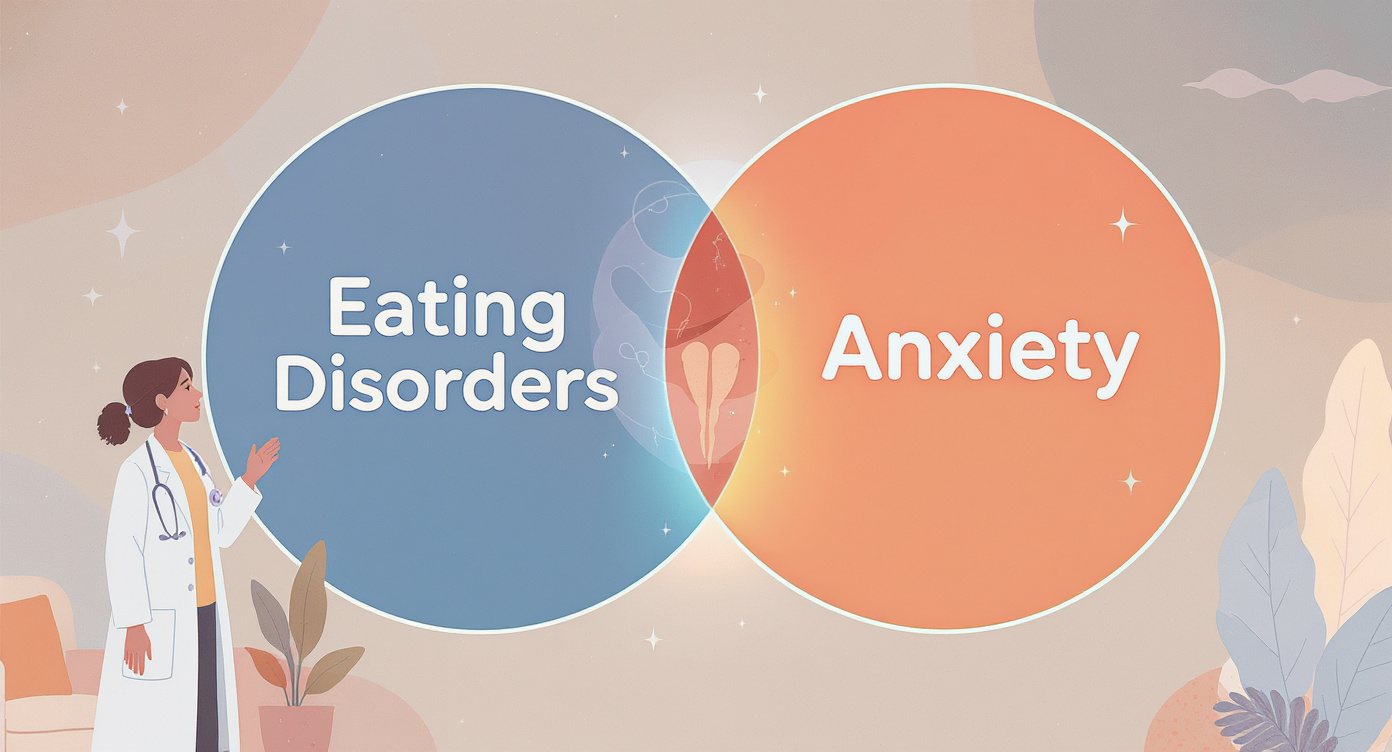The Overlap Between Eating Disorders and Anxiety

Eating disorders are complex conditions that affect both the body and the mind. While they often begin with concerns about food, weight, or body image, they are rarely just about eating. For many individuals, eating disorders exist alongside other mental health conditions—most commonly anxiety disorders.
Understanding the overlap between eating disorders and anxiety is crucial for effective treatment. When these conditions are addressed together, individuals have a better chance of achieving long-term recovery and building healthier relationships with both food and themselves.
How Anxiety Contributes to Eating Disorders
Anxiety can manifest in many forms, from constant worry and panic attacks to obsessive thoughts and compulsive behaviors. For some, these patterns of anxiety contribute directly to disordered eating habits.
For example, someone with high levels of social anxiety may avoid eating around others or severely restrict food to maintain a sense of control. Others may binge eat to cope with overwhelming stress or worry. In each case, the eating disorder becomes a way to manage—or temporarily silence—the anxiety.
Unfortunately, while these behaviors may provide short-term relief, they often intensify anxiety over time. Feelings of guilt, shame, or fear of judgment create a cycle that is difficult to escape without proper treatment.
The Shared Cycle of Control
Both eating disorders and anxiety often revolve around a need for control. Individuals may feel powerless in other areas of life, and controlling food intake or body image becomes a way to regain a sense of stability.
However, this perceived control is often misleading. Restrictive diets, binge-purge behaviors, or compulsive exercise quickly spiral into patterns that are harder to break free from. At the same time, anxiety amplifies these patterns, convincing the individual that without these rituals, they cannot cope.
Recognizing this overlap helps explain why treating one condition without addressing the other is often ineffective. To break the cycle, both the eating disorder and the underlying anxiety must be understood and treated together.
Physical and Emotional Consequences
The overlap between eating disorders and anxiety does more than shape behaviors—it also impacts physical and emotional well-being. Physically, eating disorders can lead to malnutrition, fatigue, and serious health complications. Anxiety, in turn, can intensify physical symptoms such as headaches, rapid heartbeat, and digestive issues.
Emotionally, the combination often results in overwhelming stress, feelings of inadequacy, and difficulty maintaining relationships. Many individuals report that their anxiety fuels their eating disorder behaviors, while the eating disorder intensifies their anxiety—a feedback loop that is difficult to break without support.
Why Integrated Treatment Is Essential
Because eating disorders and anxiety are so interconnected, treatment must be integrated. Addressing only the symptoms of disordered eating without exploring underlying anxiety often leads to relapse. Similarly, treating anxiety without considering how it influences eating behaviors leaves critical issues unresolved.
Comprehensive treatment typically involves therapy approaches that address both conditions at once. Cognitive behavioral therapy (CBT), for instance, helps individuals challenge anxious thought patterns while also developing healthier coping mechanisms for food and body image. Mindfulness and stress management strategies also play a key role in reducing the intensity of anxiety while supporting recovery.
Programs that offer specialized care—such as anorexia treatment centers Florida—are uniquely equipped to address these overlapping needs. By providing both medical and therapeutic support, these centers help individuals build healthier habits and develop resilience against anxiety-driven triggers.
The Role of Community and Support
Beyond professional treatment, support from peers, family, and community members is vital. Many people struggling with both anxiety and eating disorders feel isolated or misunderstood. Being part of a recovery-focused community reminds individuals that they are not alone and that others understand the challenges they face.
Family support is also essential. Loved ones can help recognize anxiety-driven patterns and encourage healthier coping strategies. With the right guidance, families learn how to provide encouragement without reinforcing harmful behaviors.
Moving Toward Healing
The path to recovery is rarely straightforward, especially when anxiety and eating disorders are intertwined. Progress may come with setbacks, but each step forward represents resilience and growth.
Healing requires addressing both conditions simultaneously—treating the anxious mind while also building a healthier relationship with food and body image. With comprehensive care, individuals can learn to manage anxiety more effectively without turning to harmful eating behaviors.
Breaking the Cycle Together
The overlap between eating disorders and anxiety underscores the importance of integrated treatment and compassionate support. These conditions feed into one another, creating cycles that can feel impossible to break. But with specialized care, therapy, and community support, recovery is not only possible—it’s sustainable.
By addressing both disorders at once, individuals can find freedom from the patterns that have held them back and move toward a life marked by balance, confidence, and hope.
